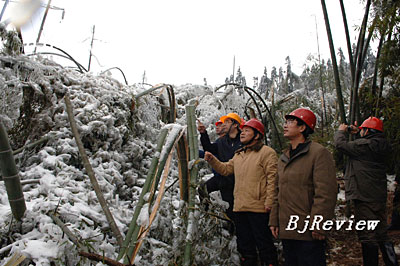|

No one could have predicted the seldom-seen blizzards that, starting from mid-January, swept through southern China. Temperatures there in January usually averaged above zero, and only occasionally dip below.
Yet, in defiance of the usual cases, snowstorms roared through this part of the country, destroying simply constructed factory buildings, knocking out power lines, and bringing down branches from numerous trees.
Endowed with rich forest resources, the forestry industry in the south is one of the country's most vibrant. This is also a reason why the storm became such a catastrophe--nearly 18.6 million hectares of forests, or around 10 percent of the national total, were damaged.
According to Xiao Xingwei, head of the Department of Forest Resources under the State Forestry Administration, it will take a decade or more to restore the damaged forests to their prior state.
Rough estimates from the State Forestry Administration put direct economic losses from the blizzard at 57.3 billion yuan ($8.1 billion).
"The nightmare for China's forests has not come to an end," said Xiao. "In response, forestry departments across the country have waged a rescuing drive to rehabilitate the forests and minimize losses."
Future impact
Zhu Lieke, Deputy Director of the State Forest Administration, is deeply aware of the haplessness that victims of the blizzard in the coastal Fujian Province were presented with, when the storms swept through the region.
"The raging blizzard brought havoc to cities and rural villages, leaving collapsed bamboo and trees everywhere."
Zhu personally talked to a foresting family who sat around a hot stove under a leaky roof. The host told Zhu, "I can still deal with the leaking roof. But the loss of the bamboo groves has cut off our lifeblood for the next two or three years."
Zhu confessed to being distressed by these words. In the disaster-stricken areas, the farmers derive over 50 percent of their income from forestry. As a result, their income in 2008 will be severely constrained, and they will have to bear the brunt through the next three to five years.
Zhu and his colleagues pledged new initiatives to aid the farmers, including distributing interest subsidies for credit to help them recover their forestry production.
According to Zhu, the blizzard has posed not only a headache for the livelihood of the people, but also a thorny problem for the ecology of disaster-stricken areas.
By the end of 2007, China had reported a forest coverage rate of over 18 percent. But this figure may be shrinking because of the snowstorms, which damaged many areas reforested between 2004 and 2006. Among these were many important ecological areas, such as forests and natural reserves turned from farmland. The widespread devastation from the storms not only hurts China's ecology, but also makes it more difficult for the country to reach its goal of a 20-percent forest coverage rate by 2010.
| 